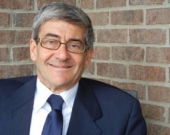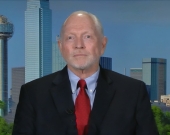David L. Phillips: The US has no better friend in the Middle East than the Kurds
December 2, 2018
Exclusive Interviews

David L. Phillips is currently Director of the Program on Peace-building and Rights at Columbia University’s Institute for the Study of Human Rights. Phillips has worked as a senior adviser to the United Nations Secretariat and as a foreign affairs expert and senior adviser to the U.S. Department of State. He has held positions as a visiting scholar at Harvard University’s Center for Middle East Studies, executive director of Columbia University’s International Conflict Resolution Program, director of the Program on Conflict Prevention and Peace-building at the American University, Associate Professor at New York University’s Department of Politics, and as a professor at the Diplomatic Academy of Vienna. He is the author of the book “The Kurdish Spring: A New Map of the Middle East”, and recently he has written another book entitled “The Great Betrayal: How America Abandoned the Kurds and Lost the Middle East”. In an exclusive interview with our Magazine he answered our questions as the following:• You have just published a book entitled “The Great Betrayal: How America Abandoned the Kurds and Lost the Middle East”. Would you please summarize the main content and message of this book?
- The US has no better friend in the Middle East than the Kurds. It betrayed the Kurds in Iraq by failing to support their goal of independence. Kurds and Americans share values. Kurds cooperated with the US over several decades and deserved America’s support. In addition to betraying the Iraqi Kurds, the US recruited Kurds in Syria to fight ISIS and I fear the US will betray them as well. The Trump administration’s unflinching support for Saudi Arabia raises serious concerns about America’s commitment to human rights and democracy.

• So overall can we say that the US has no clear, consistent and comprehensive policy for dealing with the issues and challenges of this region?
• The US policy is driven by one goal, to defeat ISIS. Countering violent extremism needs more than hard power. It requires support for freedom, democracy and human rights.
• So do you believe that the US policy in this region is predicated on misunderstanding of the real situation of this region?
- America’s actions are guided by a lack of principle. It should stand with its friend rather than try to placate its enemies. Failing to stand with the Kurds even when nearly 93% voted for independence created an opening that Iran exploited.
• But why the US is ceding the ground for other powers and allows them to establish their hegemony and extend their influence in this region?
- The US has made many mistakes. It ceded influence to Iran and Turkey. Ankara’s proxy in Syria, the Free Syrian Army, is dominated by al-Nusra and al-Qaeda. America’s lack of leadership was filled by bad actors.
• But can we expect any significant shift in the US policy toward this region?
- I don’t think we can expect any shift during the Trump administration. The US has no coherent strategy towards the Kurds or towards Iraq. ISIS will emerge with a new name and in a new form.
• So what should be done in this regard?
- The US needs to address the democracy deficit, the economic deficit, and the gender equality deficit in order to drain the swamp of support for ISIS.
• But realistically speaking what are the prospects for addressing these issues in Iraq which is a deeply dysfunctional state?
- Iraq was a dysfunctional state, and still is. The government in Baghdad doesn’t operate effectively. It’s a government unduly influenced by Iran, which takes orders form Qasem Suleimani. US policy towards Iraq has failed.
• In the previous interview with our Magazine you describe Iraq as vassal state to Iraq, is this still true for today?
- Iraq has surrendered its sovereignty and independence.
• So what the future holds for this country?
- The Kurdistan Regional Government needs to improve conditions for its people. It needs to adopt and implement a constitution. It must form a government and get to work. Iraqi Kurdistan should diversify its oil-based the economy and demonstrate to the people of Kurdistan that it’s capable of running Kurdistan’s affairs.
• Is there any prospect for real partnership between Iraq and Kurdistan, especially after the Visit of Mr. Barzani to Baghdad?
Iraq and Kurdistan are neighbors. Good neighborly relations are necessary for stability and development. It’s good to have contact with Baghdad, discuss mutual interests and ways of working together.
• What about the dream of independence?
- Nearly 93% voted for independence. The dream of independence was delayed, not destroyed. Realizing independence will take time. In the near term, Kurdistan must function like a coherent state.
• With regard to the US position toward Kurds, what the US could and should have done differently
- It should have supported Iraqi Kurdistan’s right to self-determination instead of sticking with its anti-democratic one Iraq policy.
• But as you know Kurdistan has tough neighbors, what Kurdistan can do?
Kurdistan can become a stronger and more self-reliant state by diversifying its economy. Its future constitution should have a balance of powers with strong protection of individual rights. The constitution should also protect and promote minority rights for Christians and Yezidis, as well as women’s rights.
• But can Kurdistan expect to gain international endorsement for taking these steps?
- No, I don’t think international support will be forthcoming in the near future. The US and the international community missed their chance to advance Kurdistan’s independence. The path to independence will be a long road. It will take time. The people of Kurdistan deserve the international community’s support.
• And what are the meaningful steps that the Kurds should take to promote its internal cohesion?
- Kurds should put the national interest first ahead of personal or party interests. Disunity has always been the Achilles heel of Kurdistan. During this period, Kurds must come together, develop a common vision for the future, and work in cooperation to achieve those goals.
• And what is your opinion about the recent parliamentary election and the prospect for forming a new government in Kurdistan?
- Power-sharing is always the best way for moving forward. A zero -sum game never works. The Kurds need to focus on unity and work together.
• And what about working on promoting trade and economic relations with neighbor state?
- Yes, trade and economic relations can build bridges and foster regional cooperation. Kurdistan needs to show neighbors that it’s willing to work cooperatively in the commercial sector, and set politics aside for the time being.
• And how do you consider the experiment of Kurdistan region with Turkey in this regard?
- Turkey is a big bully. It is only motivated by self-interest. It cares nothing for Kurdistan’s interest. Kurds should be worry of false friends.
• But if the US has abandoned the Kurds and Turkey is false friend, what the Kurds should do?
- The Kurds are the weakest party in this region. Kurdistan doesn’t want to have a dispute or fight with its neighbors. Kurdistan should focus on trade and economy, deferring discussion about democratic self-determination until Kurdistan is in a stronger position or until the US has a new government that more fully appreciates the important role the Kurds.
• Don’t you agree that the Kurds hope in US will not be promising and encouraging?
- The US has repeatedly sold out the Kurds in history. It supported the 1923 Treaty of Lausanne and the Algiers accord of 1975. It encouraged the Kurdish rebellion in 1991. The recent events in Kirkuk and failure to oppose Iran’s intervention is another example of America’s betrayal of the Kurds. Can we expect the better for the future? I don’t know. We can hope for better relations and greater support. If history is any measure, the Kurds don’t have great cause for hope.
* What is your assessment of what is called maximum pressure campaign by Trump’s administration against Iran?
- I don’t believe there is a maximum pressure campaign. If it were a serious campaign, Iran would not be allowed to export its oil to 8 countries for 6 months. Just empty words by the Trump administration. The recent murder of Jamal Khashoggi should cause the US to rebalance its relations. Relying only on Saudi Arabia is a strategic mistake.
* How do expect the Iran’s reaction in this regard?
- Iran reacts to pressure by pushing back. The more you boil an egg, the harder it becomes. I don’t expect great reforms in Iran resulting from Trump’s so called maximum pressure campaign
* But all in all Iran is wining and it is extending its influence in the region?
- Iran has won. It controls Baghdad, Damascus, Beirut and Sana’a. This is the Iranian Shiite crescent. Tehran is feeling pretty good about its regional strategy.
* At the end what is your hope for the future?
- My hope for the future is that the people of Kurdistan live in peace and achieve prosperity and slowly make progress towards their ultimate goal, which is independence.
Link to The Great Betrayal -- https://www.ibtauris.com/Books/Humanities/History/Regional--national-history/Asian-history/The-Great-Betrayal-How-America-Abandoned-the-Kurds-and-Lost-the-Middle-East?menuitem={DFF51E2F-C0BA-4928-ACC4-415188DCDEE8}













